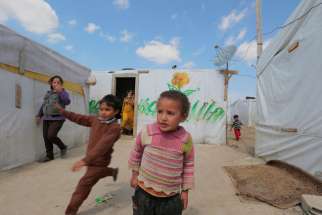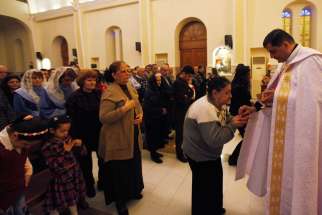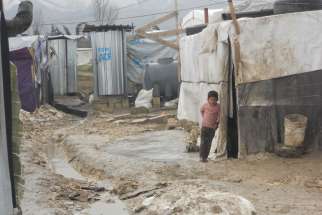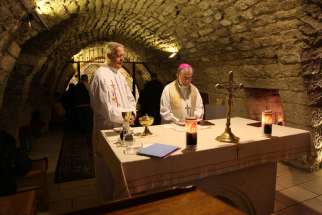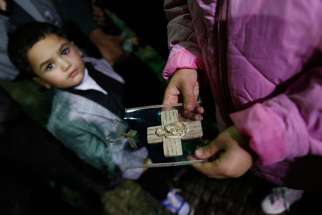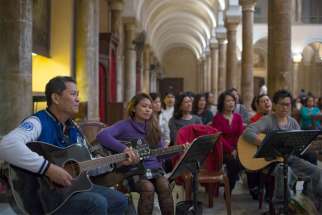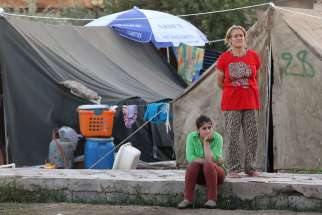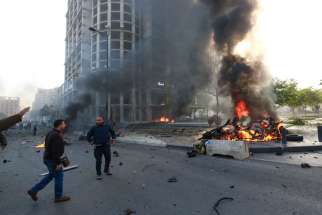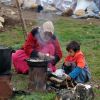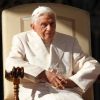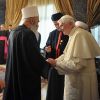BEIRUT - Lebanon's Catholic, Orthodox and Muslim religious leaders affirmed the "essential role" of the Christian presence in the Middle East and called for terrorism in the region to be confronted "culturally, educationally and politically."
Syrian children risk becoming 'lost generation,' Vatican official says to United Nations
VATICAN CITY - Without family, a legal identity and adequate education, children uprooted by the ongoing violence in Syria and the Middle East "are at risk of becoming a lost generation," said Archbishop Silvano Tomasi, permanent observer of the Holy See to the United Nations in Geneva.
BEIRUT - A pontifical aid organization has begun sending aid to families who fled their homes when Islamic State militants raided a cluster of Assyrian Christian villages on the Khabur River in northeast Syria.
Freezing temps, 60-mph winds, tents: Refugees struggle in Bekaa Valley
BEKAA VALLEY, Lebanon - Many Lebanese have spent as much time as possible indoors this winter, protecting themselves from this year's unusually brutal cold season.
CNEWA officials look at long-range needs of Lebanon's refugees
BEIRUT - Officials of a pontifical aid agency said they saw much that needed done in Lebanon -- if they could get beyond crisis mode.
As some Mideast countries empty of Christians, Lebanese numbers swell
SED EL BOUSHRIEH, Lebanon - Aramaic, Syriac and different Arabic dialects from Iraq and eastern Syria can be heard on the narrow hilly streets of Sed El Boushrieh. Strings of Christmas lights adorn neighborhood churches and hang from balconies of apartments, whose residents many never return to their own homes in Iraq and Syria.
Filipinos in Lebanon work, sacrifice to support families at home
BEIRUT - She wakes up before the rest of the family, prepares their breakfast and begins a long day of cleaning the house, washing clothes, cooking and taking care of the children.
Yet she's always thinking of her own family some 8,000 kilometres away.
'It pierced my heart like a knife,' nun says after visit to Iraqis
BEIRUT - Sister Marie Claude Naddaf, provincial leader of the Sisters of the Good Shepherd for Lebanon and Syria, is still shaken by what she witnessed visiting Irbil, Iraq.
BEIRUT - The memory of that brutal June evening in his home near Mosul, Iraq, brought 48-year-old Joseph, now a refugee in Lebanon, to tears.
Lebanon's Maronite bishops condemn Islamist incursions
BEIRUT - Lebanon's Maronite Catholic bishops underscored their "full confidence" in the country's military and security forces as the Lebanese army battled Islamist militants' incursion into Lebanon near the border with Syria.
Lebanese church agency helps refugees from Syria navigate UN system
BEIRUT - When Syrian refugees arrive in Lebanon, help begins with a phone call to the U.N. refugee agency -- if they can get through.
Pope sends $1 million in aid for Syria, cardinal delegate to Lebanon
VATICAN CITY - Instability and increasing violence in Syria have prompted Pope Benedict XVI to cancel the planned visit to the war-torn nation by a delegation of cardinals and bishops.
Instead, the pope announced Nov. 7, he has sent a smaller group to Lebanon to deliver a $1 million donation and boost the church's humanitarian response to the crisis.
The pope also appealed for dialogue to end the Syrian conflict, saying: "We have to do everything possible because one day it could be too late."
"I renew my invitation to the parties in conflict, and to all those who have the good of Syria at heart, to spare no effort in the search for peace and to pursue through dialogue the path to a just coexistence, in view of a suitable political solution of the conflict," Pope Benedict said at the end of his general audience in St. Peter's Square.
"I continue to follow with great concern the tragic situation of violent conflict in Syria, where the fighting has not ceased and each day the toll of victims rises, accompanied by the untold suffering of many civilians, especially those who have been forced to abandon their homes," he said.
He said he had hoped to send a delegation of three cardinals, three bishops and a priest to Syria during the world Synod of Bishops, which met for three weeks at the Vatican in October, to show solidarity with victims and encourage peace negotiations. The papal delegation to Damascus was to have included Cardinal Timothy M. Dolan of New York, who is chairman of the board of the Catholic Near East Welfare Association.
"Unfortunately, due to a variety of circumstances and developments, it was not possible to carry out this initiative as planned," the pope said, "and so I have decided to entrust a special mission to Cardinal Robert Sarah, president of the Pontifical Council Cor Unum," which promotes and coordinates Catholic charitable giving.
Together with Cor Unum's secretary, Msgr. Giampietro Dal Toso, and Michel Roy, secretary-general of the Vatican-based umbrella group of Catholic aid agencies, Caritas Internationalis, Cardinal Sarah was to be in Lebanon Nov. 7-10, where he was to meet with priests, religious and lay representatives of Christian churches in Syria.
"He will visit a number of refugees from that country and will chair a meeting of Catholic charitable agencies to coordinate efforts, as the Holy See has urgently requested, to provide assistance to the Syrian people, inside and outside the country," the pope said of Cardinal Sarah's mandate.
The cardinal will deliver a $1 million donation made by participants in the Oct 7-28 synod and the pope himself. The money is to provide humanitarian aid and support local churches in an effort to bring some relief to those hit by the crisis, Jesuit Father Federico Lombardi, Vatican spokesman, told reporters.
The papal delegation's visit itself is also meant to "prompt all sides involved, as well as those who hold dear the good of Syria, to seek a just and peaceful solution to the conflict, Father Lombardi added.
Syria's civil war has left thousands dead and has displaced hundreds of thousands of people since March 2011.
Emissary of hope
As war raged in Syria and an anti-Muslim film ignited violence across the Arab world, Pope Benedict calmly arrived last week in Lebanon as a “pilgrim of peace.”
The 85-year-old pontiff would have been excused if, citing age and security concerns, he’d postponed this trip. During his three-day stay, 25 people were injured and a man killed in Lebanon’s second largest city, Tripoli, during protests aimed at an American film that mocks Islam. The day after he left, missiles from Syrian jets hit Lebanese territory. The region, habitually unsafe, is particularly dangerous right now.
The purpose of the trip was to officially endorse the Apostolic Exhortation that was drafted following the 2010 Synod of Bishops for the Middle East. That task could have been accomplished in the Vatican, of course, and transmitted live worldwide by video-conferencing and Internet technology. Yet the Pope dismissed that option.
Instead, he made the right and courageous decision to stand beside the Christians of the region and, by his physical presence, acknowledge the hardships they endure by living in nations that are often hostile to Christianity. That simple act alone says much about the Pope. Then, addressing some 20,000 young people from several Middle East countries, he urged them to be the vanguard to keep Christianity alive in the lands of its birth.
Middle East Christians, facing social and economic discrimination and seeking safety for their families, have been emigrating in droves to Europe and North America. At the current pace, Christianity might virtually disappear from the region in a generation. It is asking much of young Christians to endure financial and religious hardship, but that is exactly what the Pope implored. To be effective, the message had to be delivered in person.
“I am aware of the difficulties you face daily, on account of instability and a lack of security, and your sense of being alone and on the margins,” he said. But, he added, “You are meant to be protagonists of your country’s future.”
The Pope’s Apostolic Exhortation lays a common-sense framework for Middle East Christianity to endure. It emphasizes dialogue, respect, equality, tolerance and forgiveness among Christians, Muslims and Jews, while denouncing secularism and fundamentalism. The Pope urged young people to never be afraid or ashamed of being Christian and he affirmed their right to religious liberty, to live publicly as Christians and to participate fully in civil life.
The Pope arrived in Lebanon as a pilgrim of peace but departed as an emissary of inspiration and hope. He ignored the latest regional upheaval and chose boldly to stand among the anxious Christians to let them know in person that he will not abandon them. That may have been the most important message of all.
Pope calls Middle Eastern Christians to promote peace through service
BEIRUT - Pope Benedict XVI acknowledged the suffering of Christians in the Middle East, reassuring them and urging them to promote peace through religiously inspired service to their societies.
"Your sufferings are not in vain," the pope told a crowd of at least 350,000 at a sweltering outdoor Mass at Beirut's City Center Waterfront Sept. 16. "Remain ever hopeful because of Christ."
In his homily, Pope Benedict commented on the day's reading from the Gospel of St. Mark, in which Jesus foretells his death and resurrection. Jesus is a "Messiah who suffers," the pope said, "a Messiah who serves, and not some triumphant political savior."
Speaking in a region riven by sectarian politics, where party loyalties are often determined by religious affiliation, the pope warned that people can invoke Jesus to "advance agendas which are not his, to raise false temporal hopes in his regard."
Pope Benedict told his listeners, whose travails of war and economic insecurity he had acknowledged repeatedly throughout his visit, that Christianity is essentially a faith of redemptive suffering.
"Following Jesus means taking up one's cross and following in his footsteps along a difficult path which leads not to earthly power or glory but, if necessary, to self-abandonment, to losing one's life for Christ and the Gospel in order to save it," he said.
Yet Pope Benedict also cited another of the day's Mass readings, the epistle of St. James, to emphasize the spiritual value of "concrete actions" and works, concluding that "service is a fundamental element" of Christian identity.
Addressing a region where Christian-run social services, including schools and health care facilities, are extensively used by the Muslim majority, the pope stressed the importance of "serving the poor, the outcast and the suffering," and called on Christians to be "servants of peace and reconciliation in the Middle East."
"This is an essential testimony which Christians must render here, in cooperation with all people of good will," Pope Benedict said.
During the homily, the only sound was the pope's voice and its echo from the loudspeakers. Many people leaned over and bowed their heads with eyes closed, so they could concentrate more deeply.
Following the Mass, the pope formally presented patriarchs and bishops of the Middle East with a document of his reflections on the 2010 special Synod of Bishops, which was dedicated to the region's Christians. In the 90-page document, called an apostolic exhortation, the pope called for religious freedom and warned of the dangers of fundamentalism.
Sheltered from the sun only by white baseball caps and the occasional umbrella, people had already packed the city's central district by 8 a.m., almost an hour-and-a-half before the pope arrived in the popemobile, which took him to the foot of the altar. In temperatures that rose into the high 80s, the pope celebrated Mass under a canopy while bishops and patriarchs on either side wiped their brows and fanned themselves with programs.
Aside from the complimentary white pope caps, people in the crowd improvised versions of sun protection with torn pieces of corrugated boxes tied around heads and papal and Lebanese flags worn as bandanas.
George Srour, 38, estimated that 20,000 people came from Zahle in a convoy of chartered school buses, leaving at 5 a.m. for the 10 a.m. Mass.
"We Christians must be united and participate" in the pope's visit, Srour told Catholic News Service, "otherwise there will be no more Lebanon. It will become like Iraq, and now Syria, with all the Christians leaving."
- - -
Contributing to this story was Doreen Abi Raad.
Pope says religious freedom is necessary for Middle East peace
BEIRUT - Peace will not come to the Middle East until its nations enjoy religious freedom, since only the free practice of faith can inspire the region's diverse peoples to unite around basic human values, Pope Benedict XVI said Sept. 15.
The pope addressed a multifaith gathering of Lebanon's political, religious and cultural leaders at the presidential palace in Baabda on the second day of a three-day visit to the country.
Pope Benedict's travels coincided with a wave of often-violent protests -- prompted by an American-made film denigrating Islam -- in at least a dozen Muslim countries. On Sept. 14, protesters denounced the papal visit during a demonstration in the Lebanese city of Tripoli; one person died and 25 were wounded in a clash that followed.
In his speech to the nation's leaders, the pope did not refer specifically to any of the region's many past or present conflicts, including the current civil war in neighboring Syria, but noted that the "centuries-old mix" of cultures and religions in the Middle East has not always been peaceful.
Peace requires a pluralistic society based on "mutual respect, a desire to know the other, and continuous dialogue," the pope said, and such dialogue in turn depends on consciousness of sharing fundamental human values, cherished and sustained in common by different religions. Thus, he argued, "religious freedom is the basic right on which many rights depend."
The pope spoke after meeting privately with Lebanon's president and prime minister, the president of parliament, and leaders of the country's four major Muslim communities: Sunni, Shiite, Druze and Alawite. Lebanon's population is estimated to be about 60 percent Muslim and almost 40 percent Christian, with both groups divided into many smaller communities.
In an apparent reference to the many Middle Eastern countries that restrict the practice or expression of religions other than Islam, the pope said that freedom must go beyond "what nowadays passes for tolerance," which he said "does not eliminate cases of discrimination" but sometimes "even reinforces them."
"The freedom to profess and practice one's religion without danger to life and liberty must be possible to everyone," he said.
Those remarks echoed portions of a document that Pope Benedict signed the previous night in Harissa and was to present formally Sept. 16 at an outdoor Mass in Beirut. The document is a collection of his reflections on the 2010 special Synod of Bishops dedicated to Christians in the Middle East.
In his talk in Baabda, the pope did not explicitly address the topic of religiously inspired violence, but included a single reference to terrorism and the assertion that "authentic faith does not lead to death."
He also said that peace requires a shared respect for human life and dignity. Those values are undermined not only by war, he said, but by a range of social ills, including unemployment, corruption, "different forms of trafficking," and an "economic and financial mindset which would subordinate 'being' to 'having.'"
The pope also warned against ideologies that he said "undermine the foundations of our society" by "questioning, directly or indirectly, or even before the law, the inalienable value of each person and the natural foundation of the family" -- an apparent reference to abortion, euthanasia and same-sex marriage.
In response to such threats, Pope Benedict said, political and religious leaders should promote a "culture of peace" through education, which he said would encourage a "conversion of heart" characterized above all by a willingness to forgive.
"Only forgiveness, given and received," the pope said, "can lay lasting foundations for reconciliation and universal peace."



